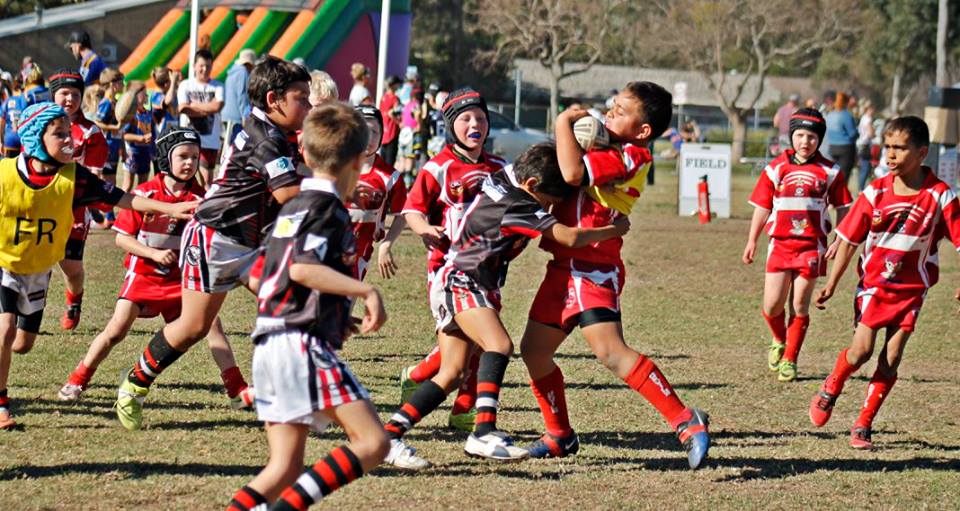By Kass Gibson (@kassgibson)
Proponents and critics of tackle rugby agree that the tackle is the most injurious aspect of the game.[1,2] Nonetheless, fierce debate regarding serious injury aetiology, harm minimization and maximizing health benefit in rugby has emerged.[3,4] I write as an academic and former Physical Education (PE) teacher who supports neither banning nor teaching tackle rugby in schools.
The call for a ban focuses on school rugby and not club rugby (given the choice involved in joining a club).3 However, the term “school” is opaque and unhelpful. It is unclear whether school rugby refers to core (i.e., compulsory) or examination (i.e., GCSE and A-Level study) PE lessons and/or inter-school fixtures. Such differentiation is important.
PE is a core subject in the English national curriculum. This means PE is compulsory for every Year 1-11 (ages 5-16) pupil in a state-funded school. However, no specific sport is compulsory under the PE curriculum’s statutory programmes of study.4 Schools, PE departments, and teachers are free include sports that best match the needs of their students and staff expertise, provided students are able to meet the four aims of the programme of study, namely:
- develop competence to excel in a broad range of physical activities
- are physically active for sustained periods of time
- engage in competitive sports and activities
- lead healthy, active lives.[5]
As such, despite rugby’s strong cultural position and historical precedent in English schools,[6] from a national curriculum perspective rugby is not compulsory. Indeed no sport is compulsory or banned in PE.4 Said differently: a ban would make tackle rugby the only banned sport in core PE. This includes combat sports such as boxing, wrestling, and mixed martial arts. In examination PE (a wholly optional subject) students nominate sports, including rugby, where sporting proficiency contributes to subject grade.[7] Thus, unqualified assertions of “compulsory rugby” in schools are unhelpfully vague, potentially disingenuous and antagonistic, and as such have stymied meaningful debate. Specificity in focus between compulsory and examination PE, and extra-curricular/inter-school and community club rugby is essential. Banning the tackle will have different curtailing of autonomy in different contexts. In school rugby, as in examination PE and extra-curricular contexts, this could reasonably be considered unwelcomed medical paternalism.
Context specificity is also important is assessing evidence for a ban. Participation rate, and subsequently injury, data in PE generally and rugby specifically are poor. Robust rugby-specific evidence is available from age-grade and professional club rugby, other collision sports, and the harm reduction potential of rule changes akin to removing tackling have been demonstrated.1,3,4 However, such evidence cannot be extrapolated easily to the PE context as advocated by proponents of the ban. Similarly, the well-established health benefits of physical activity cannot be directly applied to rugby in the context of PE as a robust rebuttal as presented by critics of the ban.
Certainly any evidence of injury risk should be taken seriously. A precautionary approach is not without basis. Indeed, within core PE specifically, modified forms of rugby, such as touch rugby, will simultaneously meet curriculum aims at least as well as tackle rugby and remove the dangers of the tackle. Nonetheless, the current curriculum empowers educators to teach activities that best reflect their expertise, interests, and needs of their students.
For the reasons indicated above, evidence for both harm and benefit of rugby in school is not unequivocal. A central missing piece of evidence, then, is the experience of young people in school rugby. Simply put, the voices of those most affected by a ban, namely children and young people, are missing from the literature.[8] If medical ethics has taught us anything, the inclusion of children’s experiences, understandings, and opinions should be central to this debate.
In summary, school rugby is multi-faceted. Importantly, from a curriculum perspective, there is no demonstrable need for tackle rugby to be taught in core physical education. Therefore, any discussion of a tackle rugby ban requires careful and considerate attention to context. Such attention is essential to assess evidence available to substantiate harms and benefits of rugby for young people in school and articulate values underpinning education to enable open, honest, and productive debate. Ultimately, greater care is required to ensure whether action, or lack thereof, will protect the health and safety of children in schools. Something all sides can agree is paramount.

Kass Gibson (@kassgibson) is a Lecturer in Sports Coaching and Physical Education at Plymouth Marjon University, and member of the University of Toronto’s Suffering, Pain and Ethics Lab Scientific Team. His research examines experiences and practices in physical activity health promotion, sport, and physical education.
[1] Pollock AM, Kirkwood G. Tackle and scrum should be banned in school rugby. BMJ Opinion 2017; https://blogs.bmj.com/bmj/2017/09/25/allyson-pollock-and-graham-kirkwood-tackle-and-scrum-should-be-banned-in-school-rugby/ (accessed 28 September 2017).
[2] Burger N, Lambert MI, Viljoen W, et al. Tackle-related injury rates and nature of injuries in South African Youth Week tournament rugby union players (under-13 to under- 18): an observational cohort study. BMJ Open 2014;4: e005556. doi:10.1136/ bmjopen-2014-005556
[3] Pollock AM, White AJ, Kirkwood G. Evidence in support of the call to ban the tackle and harmful contact in school rugby: a response to World Rugby Br J Sports Med 2017;51:1113-1117.
[4] Tucker R , Raftery M , Verhagen E. Injury risk and a tackle ban in youth Rugby Union: reviewing the evidence and searching for targeted, effective interventions. A critical review. Br J Sports Med 2016;50:921–5.doi:10.1136/bjsports-2016-096322
[5] Department for Education. National Curriculum in England: PE programmes of study, September 2013 https://www.gov.uk/government/publications/national-curriculum-in-england-physical-education-programmes-of-study (accessed 27 September 2017)
[6] Casey, A., Quennerstedt, M. “I just remember rugby”: Re-membering Physical Education as More Than a Sport. Research Quarterly for Exercise and Sport. 2015;86 (1), 40-50. DOI: 10.1080/02701367.2014.977430
[7] Department for Education. GCSE PE activity list, January 2015. www.gov.uk/government/uploads/system/uploads/attachment_data/file/447738/GCSE_activity_list_for_PE.pdf (accessed 27 September 2017)
[8] Messner, M.A., Musto, M. Where are the kids? Sociology of Sport Journal. 2014;31102-122